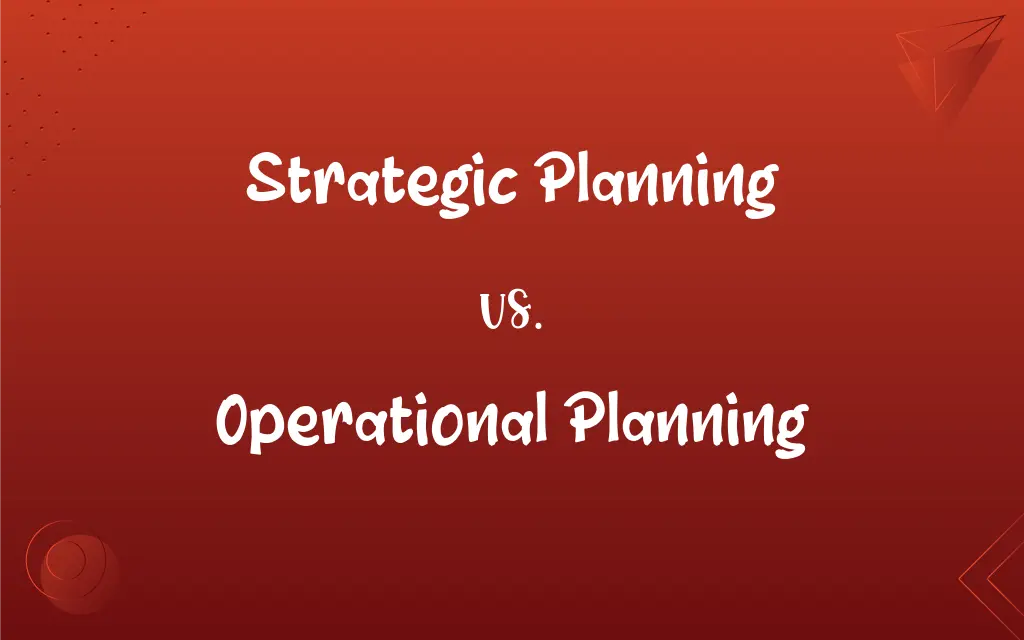Strategic Planning vs. Operational Planning: What's the Difference?
Edited by Janet White || By Harlon Moss || Updated on October 11, 2023
Strategic planning focuses on setting long-term goals and directions, while operational planning involves creating short-term processes to achieve strategic objectives.

Key Differences
Strategic planning fundamentally serves as an organization’s roadmap for the future. This form of planning takes a high-level view, focusing on long-term goals and determining the optimal direction for an organization. It involves defining a mission, vision, and values that will steer all subsequent planning and decision-making. Strategic planning allows entities to envisage the future and prepare for various outcomes, by shaping adaptable strategies and allocating resources accordingly.
On the other hand, operational planning is firmly grounded in the present. It addresses the specific actions and processes that staff members must adopt to fulfill the strategic plan. Therefore, while strategic planning emphasizes where an organization wants to be, operational planning elucidates how to get there. It involves detailed plans of practices, resource allocation, timelines, and tasks that need to be carried out to achieve short-term objectives that align with long-term goals.
Examining their applications, strategic planning might include deciding to enter a new market or develop a new product to enhance competitive advantage. It demands critical thinking and a comprehensive understanding of the business environment, including factors such as competition, market demands, and global trends. Companies usually reevaluate their strategic plans every few years to adjust to the changing business landscape.
Conversely, operational planning typically breaks down larger strategic goals into smaller, actionable tasks. It includes formulating a detailed budget, setting short-term objectives, and determining the specific tasks and processes that will be implemented to meet these objectives. It is concerned with the day-to-day operations of the organization and is usually revisited on a much more frequent basis than strategic planning, ensuring that daily activities align with strategic objectives.
Both strategic planning and operational planning are critical for an organization’s success but serve different purposes. Strategic planning lays down what needs to be achieved and operational planning elucidates how to achieve it. Thus, these two planning types are not mutually exclusive but rather complementary, with operational planning functioning to implement the vision laid out in the strategic plan.
ADVERTISEMENT
Comparison Chart
Time Horizon
Focuses on long-term objectives and visions
Deals with short-term, day-to-day tasks
Detail Level
High-level, less detailed
Detailed, specifying exact processes
Frequency of Review
Usually reviewed every few years
Often reviewed and adjusted regularly
Objective
Setting overall organizational goals
Implementing processes to achieve goals
Scope
Involves the entire organization
Can be department or team-specific
ADVERTISEMENT
Strategic Planning and Operational Planning Definitions
Strategic Planning
Strategic planning involves analyzing internal and external factors to form a future roadmap.
ABC Corp. utilized strategic planning to identify new market trends and align their products accordingly.
Operational Planning
Operational planning provides detailed methodologies and timelines to accomplish strategic aims on a day-to-day basis.
By applying rigorous operational planning, the event company successfully coordinated logistics, vendors, and schedules for the global conference.
Strategic Planning
It’s a systematic process to define a future direction and make decisions on resource allocations.
Through strategic planning, the company decided to allocate more resources to its digital transformation initiative.
Operational Planning
Operational planning translates strategic goals into manageable tasks and short-term objectives.
The manager engaged in operational planning to allocate weekly tasks to the team, aligning with the quarterly objectives.
Strategic Planning
It creates a framework for organizational decision-making and prioritizing initiatives.
Strategic planning helped XYZ Ltd. to prioritize its research and development projects for the next decade.
Operational Planning
It entails the formulation of detailed plans that guide the day-to-day activities within an organization.
Through effective operational planning, the company ensured that daily activities were systematically directed toward strategic goals.
Strategic Planning
Strategic planning establishes an organization’s long-term vision, mission, and objectives.
The CEO emphasized the need for forward-looking strategic planning to navigate future market challenges.
Operational Planning
It focuses on optimizing resources, including manpower, materials, and processes, in the short term.
Operational planning was pivotal in determining the optimal use of available resources during the supply chain disruption.
Strategic Planning
Strategic planning determines where an organization wants to be in the future and how to get there.
The nonprofit used strategic planning to establish its objectives in reducing homelessness over the next five years.
Operational Planning
Operational planning involves specifying outcomes, outputs, and actions to achieve short-term objectives.
Operational planning was crucial in establishing a detailed production schedule to meet the seasonal demand spike.
FAQs
Who is typically involved in strategic planning?
Top management, including CEOs, directors, and sometimes external consultants.
What role do employees play in strategic planning?
Employees may contribute ideas, and their capabilities and buy-in are vital to executing strategic plans.
How does strategic planning ensure competitive advantage?
It helps to anticipate market changes, align resources, and position the organization advantageously in the market.
How often should strategic planning be revisited?
It’s typically revisited every 3-5 years, but can vary based on organizational needs.
Who typically conducts operational planning?
Middle and lower-level management, often involving team leaders.
How does operational planning support strategic planning?
It breaks down strategic objectives into actionable tasks, facilitating their realization on a daily basis.
How does technology impact strategic planning?
Technology can influence strategic goals, offering new opportunities or presenting competitive challenges.
What is a common tool used in operational planning?
Gantt charts are commonly used to visualize project timelines and task allocations.
What elements are crucial in strategic planning?
Vision, mission, values, SWOT analysis, long-term objectives, and action plans.
Can operational planning respond to immediate issues?
Yes, it is adaptable and can be modified to address unforeseen challenges or opportunities.
Does operational planning require cross-departmental coordination?
Often, yes. It usually needs collaboration across various departments to ensure cohesive operation.
In what way does operational planning manage resources?
It allocates and optimizes resources like manpower and materials to efficiently achieve short-term objectives.
Is a budget part of operational planning?
Yes, creating a detailed budget is a crucial component of operational planning.
Can operational planning be conducted without a strategic plan?
While possible, without a strategic plan, operational planning may lack direction and coherence with overall organizational goals.
What is the main objective of strategic planning?
To establish long-term objectives and determine the direction for the organization.
What is the primary focus of operational planning?
Achieving short-term objectives and ensuring daily operations align with strategic goals.
How do external factors influence strategic planning?
Market trends, competition, and regulatory environments significantly impact strategic decision-making.
Can strategic planning affect organizational structure?
Yes, it may dictate changes in structure to align with new strategic directions.
How is operational planning implemented?
Through detailed plans that outline specific tasks, responsibilities, timelines, and resources.
Can strategic planning be altered?
Yes, it may be revised to accommodate significant changes in the internal or external environment.
About Author
Written by
Harlon MossHarlon is a seasoned quality moderator and accomplished content writer for Difference Wiki. An alumnus of the prestigious University of California, he earned his degree in Computer Science. Leveraging his academic background, Harlon brings a meticulous and informed perspective to his work, ensuring content accuracy and excellence.
Edited by
Janet WhiteJanet White has been an esteemed writer and blogger for Difference Wiki. Holding a Master's degree in Science and Medical Journalism from the prestigious Boston University, she has consistently demonstrated her expertise and passion for her field. When she's not immersed in her work, Janet relishes her time exercising, delving into a good book, and cherishing moments with friends and family.































































